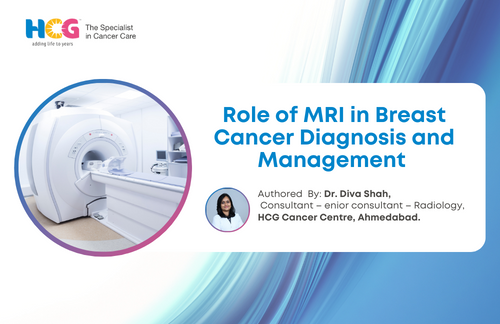
21 Oct, 2022

21 Oct, 2022
This article is contributed by Dr. Diva Shah, Senior consultant – Radiology, HCG Cancer Centre, Ahmedabad.
Breast cancer is the commonest malignancy among women globally and 4th most common cancer in India. Its accurate diagnosis and timely treatment become paramount in its successful management. Mammography is considered as “Gold Standard” in diagnosis and screening of breast cancer, apart from mammography, ultrasound and MRI being offered as adjuvant modalities.
When is MRI Recommended for Breast Cancer Patients?
Although one of the highly effective diagnostic modalities, MRI is recommended in selected cases only. The doctor may recommend an MRI in women:
In these cases, MRI scans support the early detection of breast cancer and help in deciding treatment strategy. It also acts as screening tool for hereditary breast cancer patients.
What are the Advantages of MRI Scan in Breast Cancer Patients?
Throughout breast cancer treatment, MRI is recommended in various phases due to its sensitivity and precision. The following are some of the important indications of MRI scan:
What Should You Do?
Although an MRI scan is highly effective in diagnosing breast cancer, it is still not considered a replacement for mammography, as microcalcifications are missed during an MRI scan.
If you see yourself as a high-risk individual and are thinking of getting an MRI scan for accurate results, you should consult the breast cancer specialist, who can help you with appropriate guidance on undergoing an MRI scan for breast cancer screening and diagnosis.
Breast Cancer Management at HCG Cancer Centre, Ahmedabad
At HCG Cancer Hospital, we have advanced MRI facilities and highly skilled team of cancer specialists who have a deep level of expertise in the diagnosis and management of breast cancers.
Our team focuses on devising personalised treatment plans that are centred on the needs of the patient. This approach allows us to achieve superior clinical results while preserving the patients quality of life.
Bottom Note
MRI Breast is a powerful tool in breast cancer imaging diagnostic workup of breast cancer, especially in high-risk individuals. It is an adjuvant tool with mammography in screening, diagnosis and in follow up. Role of MRI will continue to evolve as technology improves and it will triage patients for better treatment options. Also, it is important to devise strategies to make this modality cost-effective so that it can help more women put themselves ahead of breast cancer.